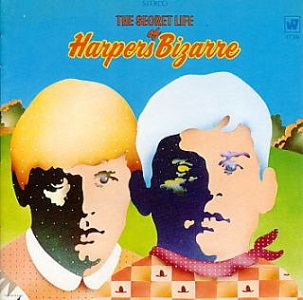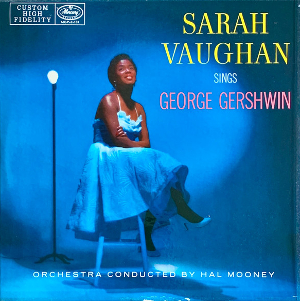
"If You Were the Only Girl (In the World)" is a popular song, written by Nat D. Ayer with lyrics by Clifford Grey. It was written for the musical revue The Bing Boys Are Here, which premièred on 19 April 1916 at the Alhambra Theatre in Leicester Square, London. The song was originally performed as a duet between Lucius Bing, played by George Robey, and his love interest Emma, originated by Violet Loraine.

The Secret Life of Harpers Bizarre is an album by Harpers Bizarre, released in September 1968.
"Too Marvelous for Words" is a popular song written in 1937. Johnny Mercer wrote the lyrics for music composed by Richard Whiting. It was introduced by Wini Shaw and Ross Alexander in the 1937 Warner Brothers film Ready, Willing and Able, as well as used for a production number in a musical revue on Broadway. The song has become a pop and jazz standard and has been recorded by many artists.

Sarah Vaughan Sings George Gershwin is a 1958 studio album by Sarah Vaughan, of the music of George Gershwin.

"Somebody Loves Me" is a popular song, with music written by George Gershwin, and lyrics by Ballard MacDonald and Buddy DeSylva. The song was published in 1924 and featured in George White's Scandals of 1924.
"'S Wonderful" is a 1927 popular song composed by George Gershwin, with lyrics written by Ira Gershwin. It was introduced in the Broadway musical Funny Face (1927) by Adele Astaire and Allen Kearns.
"I've Got a Crush on You" is a song composed by George Gershwin, with lyrics by Ira Gershwin. It is unique among Gershwin compositions in that it was used for two different Broadway productions: Treasure Girl (1928), when it was introduced by Clifton Webb and Mary Hay, and Strike Up the Band (1930), when it was sung by Doris Carson and Gordon Smith. It was later included in the tribute musical Nice Work If You Can Get It (2012), in which it was sung by Jennifer Laura Thompson. When covered by Frank Sinatra he was a part of Columbia Records.
"That Certain Feeling" is a 1925 song composed by George Gershwin, with lyrics by Ira Gershwin.
"Who Cares?" is a song composed by George Gershwin, with lyrics by Ira Gershwin, written for their 1931 musical Of Thee I Sing. It was introduced by William Gaxton and Lois Moran in the original Broadway production.
"Isn't It a Pity?" is a song composed by George Gershwin, with lyrics by Ira Gershwin, written for the unsuccessful 1933 musical Pardon My English. It was introduced by George Givot and Josephine Huston.
"The Lady's in Love with You" is a popular song which was written by Burton Lane (music) and by Frank Loesser (lyrics). The song was published in 1939 and introduced in the film "Some Like It Hot" (1939) when it was sung by Bob Hope and Shirley Ross. Ms Ross also sang it in the film with Gene Krupa and His Band. The song was sung by Tony Bennett at his final concerts, at Radio City Music Hall, in 2021.
"Last Night on the Back Porch (I Loved Her Best of All)" is a popular song with music by Carl Schraubstader and lyrics by Lew Brown, published in 1923. It was introduced in the Broadway revue George White's Scandals where it was performed by Winnie Lightner.
"Of Thee I Sing" is a 1931 song composed by George Gershwin, with lyrics by Ira Gershwin.
Liza (All the Clouds'll Roll Away)" is a song composed by George Gershwin with lyrics by Ira Gershwin and Gus Kahn. It was introduced in 1929 by Ruby Keeler (as Dixie Dugan) in Florenz Ziegfeld's musical Show Girl. The stage performances were accompanied by the Duke Ellington Orchestra. On the show's opening night in Boston on June 25, 1929, Keeler's husband and popular singer Al Jolson suddenly stood up from his seat in the third row and sang a chorus of the song, much to the surprise of the audience and Gershwin himself. Jolson recorded the song a few days later on July 6, 1929, and his rendition rose to number nine on the charts of the day.

Mel Tormé live at the Maisonette is a 1975 live album by Mel Tormé.

"Do It Again" is an American popular song by composer George Gershwin and lyricist Buddy DeSylva. The song premiered in the 1922 Broadway show The French Doll, as performed by actress Irène Bordoni.

Michael & George: Feinstein Sings Gershwin is a 1998 album by American vocalist Michael Feinstein of songs composed by George Gershwin. It was Feinstein's third album of Gershwin's music, following Pure Gershwin (1987) and Nice Work If You Can Get It: Songs by the Gershwins (1996).
"I Love a Piano" is a popular song with words and music by Irving Berlin. It was copyrighted on December 9, 1920 and introduced in the Broadway musical revue Stop! Look! Listen! when it was performed by Harry Fox and the ensemble. The song was given a tremendous boost in the show as the set for it consisted of an enormous keyboard running completely across the stage. In front of this were six pianos with six pianists playing the tune. Irving Berlin always regarded the song as one of his best efforts.
"The Best Things in Life Are Free" is a popular song written by the songwriting team of Buddy DeSylva and Lew Brown (lyrics) and Ray Henderson (music) for the 1927 musical Good News. It enjoyed a revival during the period from 1947 to 1950, when it was covered by many artists.
Yes Indeed! is a 1958 album by Pat Boone on Dot Records. The album was a commercial success.







